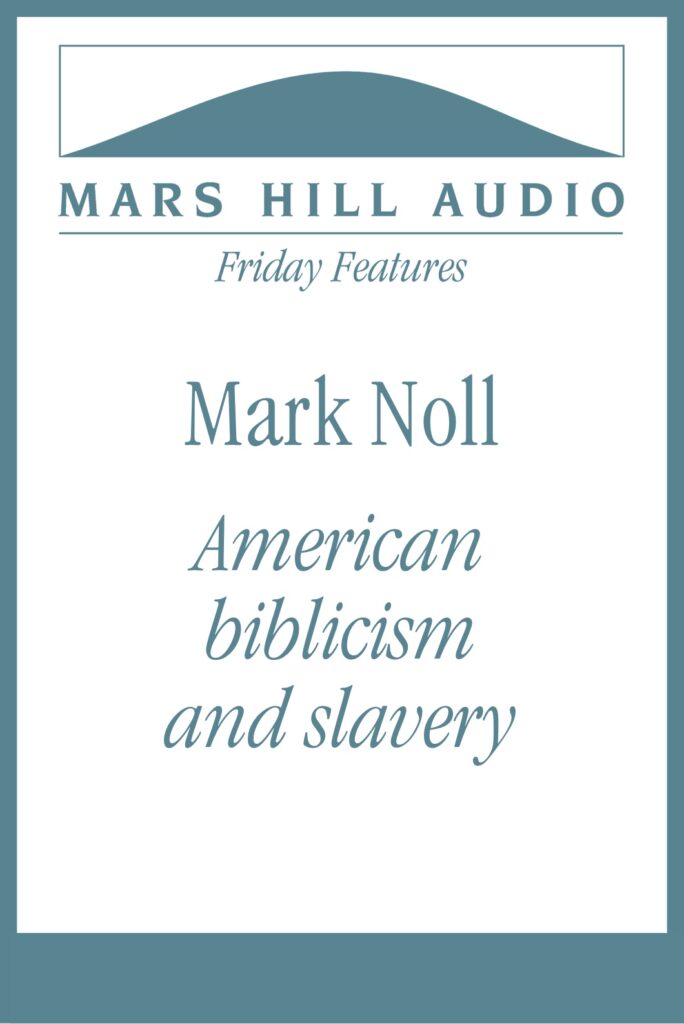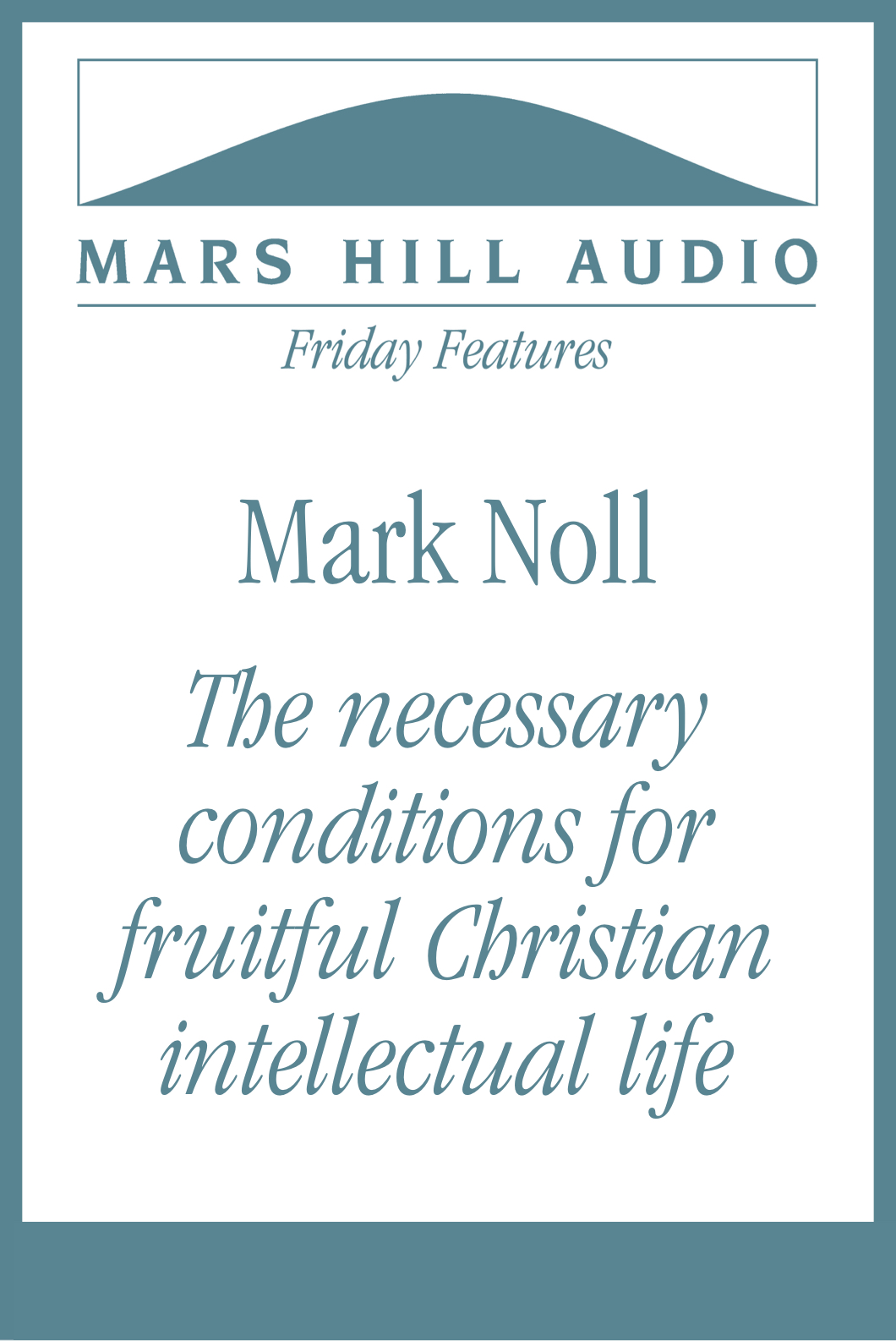released 2/25/2022
In several of his books, historian Mark Noll has pointed out that the approach in reading the Bible common in American Protestantism — an approach that relied on simplistic proof-texts — has repeatedly crippled attempts to deal with complex social and political problems. This theme was present in his 2015 book, In the Beginning Was the Word: The Bible in American Public Life, 1492-1783, and will no doubt also be present in the forthcoming volume, America’s Book: The Rise and Decline of a Bible Civilization, 1794-1911. On this Feature, Noll summarizes how 19-century arguments about the Bible and slavery often suffered from the presupposition that proof-texting was the only faithful way to read the Bible.
41 minutes
PREVIEW
The full-length track for this audio is only available to paid members and to listeners with a free Visitor’s Pass. If you are a member, log in here. If you would like a Visitor’s Pass, sign in here. You may purchase one of our complete memberships here. Happy listening!
More to hear . . .
In the 2008 book The Future of Christian Learning, historian Mark Noll argued that a vision of Christianity that understands salvation in extremely private and individualistic terms will not sustain serious and committed Christian learning. The comprehensive and universal social and cultural consequences of the Gospel have to be assumed if Christian intellectual life is to be pursued vigorously. He talked with Ken Myers about that argument on Volume 97 of the Journal, a conversation revisited in today’s Feature.
This feature is available to listeners with a Mars Hill Audio membership.
Related reading and listening
- Eugenics and the rise of “evolutionary ethics” — FROM VOL. 70 Richard Weikart describes evolutionary ethics and examines the ties between national racism and the eugenics movements of the late nineteenth and early twentieth centuries. (16 minutes)
- Mars Hill Audio Journal, Volume 162 — FEATURED GUESTS: Mark Noll, R. Jared Staudt, Paul Weston, William C. Hackett, Hans Boersma, and David Paul Baird
- Early evangelical response to C. S. Lewis — Historian Mark Noll discusses the reasons why American evangelicals were initially slow to warm to Lewis. (15 minutes)
- How Christianity crossed the Atlantic — FROM VOL. 55 Mark Noll describes the different form that the Christian faith and the life of churches took when Christianity migrated to North America. (16 minutes)
- An unwitting agent for the secularization of America — Mark Noll, Nathan Hatch, and George Marsden explain how a prominent Christian Founding Father added momentum to the secularization of America
- Noll, Mark — FROM THE GUEST PAGE: Mark Noll is Emeritus Professor of History, University of Notre Dame and Wheaton College. A prolific author, Noll’s publications cover a wide range of topics of interest to evangelicalism.
- Christian scholars and the secularized academy — Mark Noll on why Christian intellectual vitality requires a vision for the universality of Christian truth
- The future of Christian learning — Historian Mark Noll insists that for Christian intellectual life to flourish, a vision for comprehensive and universal social and cultural consequences of the Gospel has to be assumed. (18 minutes)
- Once there was no “secular” — Carlos Eire on the metaphysical assumptions championed in the sixteenth century
- Mars Hill Audio Journal, Volume 156 — FEATURED GUESTS:
Kimbell Kornu, Paul Tyson, Mark Noll, David Ney, William C. Hackett, and Marian Schwartz
- Republican freedom — and ideological flexibility — Mark Noll on the novelty of America’s Christian republicanism
- The Church and the powers that be — Historian Mark Noll summarizes Christian ideas about political life in the last few centuries, examining how those ideas were worked out in various contexts in Western Europe and North America. (39 minutes)
- Mars Hill Audio Journal, Volume 136 — FEATURED GUESTS:
Thomas Albert Howard, Mark Noll, Andrew Pettegree, Peter J. Leithart, Norm Klassen, James Litton, and Joseph O’Brien
- Mars Hill Audio Journal, Volume 124 — FEATURED GUESTS:
John Fea, Robert F. Rea, John C. Pinheiro, R. J. Snell, Duncan G. Stroik, Kate Tamarkin, and Fiona Hughes
- Mars Hill Audio Journal, Volume 122 — FEATURED GUESTS:
N. T. Wright, George Marsden, Makoto Fujimura, David Bentley Hart, and Thomas Lessl
- Mars Hill Audio Journal, Volume 110 — FEATURED GUESTS: Kevin Belmonte, David Lyle Jeffrey and Gregory Maillet, Mark Noll, Alan Jacobs, and Jonathan Chaplin
- The Vocation of Knowledge: Higher Education and the Difference Christ Makes — Mark Noll (The Future of Christian Learning), Norman Klassen & Jens Zimmermann, (The Passionate Intellect: Incarnational Humanism and the Future of University Education),and James K. A. Smith explore the nature of Christian education. (78 minutes)
- Mars Hill Audio Journal, Volume 97 — FEATURED GUESTS: Mark Noll, Stanley Fish, James Peters, Scott Moore, and Makoto Fujimura
- John Pollock: “William Wilberforce: A Man Who Changed His Times” — John Pollock’s biographical account of William Wilberforce recounts the parliamentarian’s indefatigable fight to abolish the Slave Trade in the British empire. (50 minutes)
- Mars Hill Audio Journal, Volume 81 — FEATURED GUESTS: Nigel Cameron, Joel James Shuman, Brian Volck, Russell Hittinger, Mark Noll, and Stephen Miller
- Mars Hill Audio Journal, Volume 68 — FEATURED GUESTS: Murray Milner, Jr., Steven C. Vryhof, Douglas J. Schuurman, Robert Gagnon, Richard Stivers, and Quentin Schultze
- Sources of Ancient Wisdom — Excerpts from two books about pre-modern Christian understanding: Reading Scripture with the Church Fathers, by Christopher A. Hall, and Retrieving the Tradition and Renewing Evangelicalism: A Primer for Suspicious Protestants, by D. H. Williams. (95 minutes)

